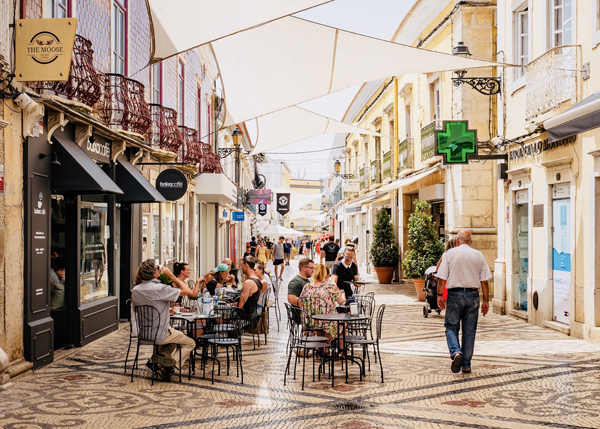Public Transportation in Faro
Summary: Mastering the public transportation system in Faro is a crucial aspect of adapting to life there. This article provides a detailed overview of the available local transit options.

Faro, a charming city in the Algarve region, offers a variety of public transportation options for both locals and tourists. These include buses, trains, taxis, and even boats. The city's public transportation is managed by several entities, including EVA Transportes, Proximo, and Comboios de Portugal. For expats living in Faro, it is entirely possible to live comfortably without a car, relying on these public transportation systems and walking. However, having a car can provide more flexibility, especially for those who wish to explore the surrounding areas of the Algarve region.
Buses
The bus system in Faro is run by two main companies: EVA Transportes and Proximo. EVA Transportes operates intercity buses that connect Faro with other cities in the Algarve region and throughout Portugal. Proximo, on the other hand, operates the city buses within Faro. The buses are generally safe and reliable, making them a popular choice for daily commuting. A single ticket for a city bus ride costs around €2.35, while intercity bus fares vary depending on the distance. The bus routes cover most areas of the city, making it easy to get around. However, the buses can get crowded during peak hours and the summer tourist season.
Trains
Comboios de Portugal, or CP, is the national railway company of Portugal and operates the train services in Faro. The train station in Faro is centrally located, making it a convenient option for travel. Trains connect Faro with other major cities in Portugal, such as Lisbon and Porto, as well as with other towns in the Algarve region. The trains are generally safe and comfortable, and they offer stunning views of the Portuguese countryside. A train ticket from Faro to Lisbon costs around €30. However, the train schedules can be less frequent compared to buses, so it's important to plan your trips accordingly.
Taxis and Ride-Sharing
Taxis are readily available in Faro, and they offer a convenient way to get around the city, especially if you're carrying heavy luggage or traveling in a group. The taxis in Faro are metered, and the fare starts at around €3.25, with an additional charge per kilometer. Uber is also available in Faro, providing another option for ride-sharing. While taxis and Uber can be more expensive than buses or trains, they offer more flexibility and can save you time, especially if you're traveling to areas not covered by the bus or train routes.
Boats
Given Faro's location on the coast, boats are another mode of public transportation in the city. Ferry services operate from Faro to the nearby islands of the Ria Formosa Natural Park, such as Ilha de Faro and Ilha da Culatra. The boat rides offer a unique way to explore the natural beauty of the Algarve region. A round-trip boat ticket to Ilha de Faro costs around €10. However, the boat schedules can be affected by the weather and the tides, so it's important to check the schedules in advance.
In conclusion, Faro's public transportation system is comprehensive and reliable, making it possible for expats to live comfortably without a car. However, having a car can provide more flexibility, especially for those who wish to explore the surrounding areas of the Algarve region.
About the Author
 Joshua Wood, LPC joined Expat Exchange in 2000 and serves as one of its Co-Presidents. He is also one of the Founders of Digital Nomad Exchange. Prior to Expat Exchange, Joshua worked for NBC Cable (MSNBC and CNBC
Primetime). Joshua has a BA from Syracuse and a Master's in Clinical and Counseling Psychology from Fairleigh Dickinson University. Mr. Wood is also a licensed counselor and psychotherapist.
Joshua Wood, LPC joined Expat Exchange in 2000 and serves as one of its Co-Presidents. He is also one of the Founders of Digital Nomad Exchange. Prior to Expat Exchange, Joshua worked for NBC Cable (MSNBC and CNBC
Primetime). Joshua has a BA from Syracuse and a Master's in Clinical and Counseling Psychology from Fairleigh Dickinson University. Mr. Wood is also a licensed counselor and psychotherapist.
Some of Joshua's articles include Pros and Cons of Living in Portugal, 10 Best Places to Live in Ireland and Pros and Cons of Living in Uruguay. Connect with Joshua on LinkedIn.
Additional Information:
- Health Care in Faro
- The Essential Guide to Faro
- Cost of Living in Faro
- Healthcare & Health Insurance in Portugal
- Best Places to Live in Portugal
- Real Estate in Portugal
- Essential Guide to the Health System in Portugal
- Pros and Cons of Living in Portugal 2025
- 2025 Guide to Moving to Portugal
- More Advice about Retiring in Portugal

 Faro, Portugal
Faro, Portugal


